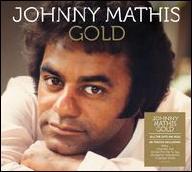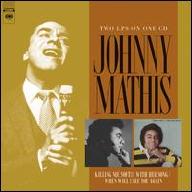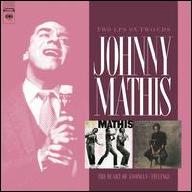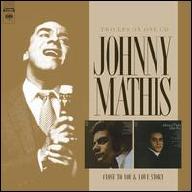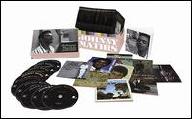Unsurprisingly, given his emphasis on long sustained notes and heavy vibrato, Mathis studied with an opera coach prior to his teenage years, and was almost lured into the profession; his other inspirations were the smoother crossover jazz vocalists of the 1940s -- Nat King Cole, Billy Eckstine, and Lena Horne. Mathis was an exceptional high-school athlete in San Francisco, but was wooed away from a college track scholarship and a potential spot on the Olympic squad by the chance to sing. He was signed to a management contract by club owner Helen Noga, who introduced the singer to George Avakian, jazz producer for Columbia Records. Avakian signed him and used orchestras conducted by Teo Macero, Gil Evans, and John Lewis to record Mathis' self-titled debut album in 1957. Despite the name talent and choice of standards, it was mostly ignored upon release.
Columbia A&R executive Mitch Miller -- known for his desperately pop-slanted Sing Along albums and TV show -- decided the only recourse was switching Mathis to Miller's brand of pop balladry, and the formula worked like a charm; the LP Wonderful Wonderful didn't include but was named after a Top 20 hit later in 1957, which was followed by the number five "It's Not for Me to Say" and his first number one, "Chances Are." From that point on, Johnny Mathis concentrated strictly on lush ballads for adult contemporary listeners.
Though he charted consistently, massive hit singles were rare for Johnny Mathis during the late '50s and '60s -- half of his career Top Ten output had occurred in 1957 alone -- so he chose to focus instead on the burgeoning album market, much like Frank Sinatra, his main rival during the late '50s as the most popular traditional male vocalist. Mathis moved away from show tunes and traditional pop into soft rock during the '70s, and found his second number one single, "Too Much, Too Little, Too Late," in 1978. Recorded as a duet with Deniece Williams, the single prompted Mathis to begin trying duets with a variety of partners (including Dionne Warwick, Natalie Cole, Gladys Knight, and Nana Mouskouri), though none of the singles enjoyed the success of the original.
Mathis continued to release and sell albums throughout the '90s -- his fifth decade of recording for Columbia -- and beyond, among them 1998's Because You Loved Me: Songs of Diane Warren and 2000's Mathis on Broadway. Mathis followed the Broadway album with 2002's The Christmas Album and 2005's Isn't it Romantic: The Standards Album, both of which found the iconic vocalist in fine form. In 2008, Mathis released the Walter Afanasieff-produced and arranged A Night to Remember, his first straight-ahead adult contemporary album in over a decade. Let It Be Me: Mathis in Nashville, Mathis' first full-length album of country music, appeared in September of 2010. The album ultimately garnered a Grammy Award nomination for Best Traditional Pop Vocal Album. Mathis released a holiday album, Sending You a Little Christmas, in 2013, and in 2017 he issued Johnny Mathis Sings the Great New American Songbook, which saw him taking on contemporary hits from the likes of Adele, Josh Groban, R. Kelly, and more.
Three months after the September release of Sings the Great New American Songbook, Legacy released the comprehensive The Voice of Romance: The Columbia Original Album Collection, a 68-CD box containing every album he released for the label between 1956 and 2017. The Voice of Romance also featured I Love My Lady, a Mathis album produced by Nile Rodgers and Bernard Edwards in 1981 but never released. ~ John Bush, Rovi


